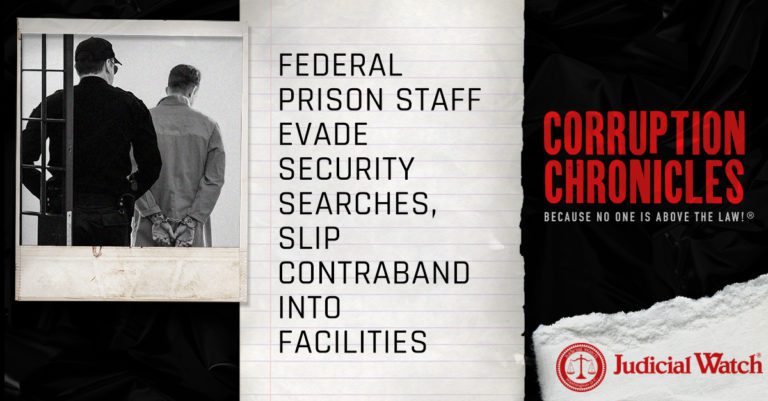

Federal Prison Staff Evade Security Searches, Slip Contraband into Facilities


In the latest of several troubling security lapses to rock the nation’s federal prison system, jail staff often enter facilities without being searched, contributing to a pandemic of contraband smuggled to inmates. Security video examined by investigators from the Department of Justice Office of Inspector General (DOJ OIG) shows staff at a high-security facility entering during the night and walking around metal detectors without being screened. The breach is one of a multitude identified recently by the watchdog, which warns the DOJ of “urgent security concerns” in its famously inefficient security system at Bureau of Prisons (BOP) locations nationwide.
In all, there are 122 federal prisons throughout the U.S. that house some 155,554 inmates. The system has around 38,000 employees and the BOP claims to protect public safety by ensuring that federal offenders serve their sentences at “appropriately secure” facilities. The reality is that security failures have long been pervasive within the system. In the latest transgressions exposed by the OIG, BOP officials seem to justify their negligence by explaining that “only during the low manning times of the night shift” are staff “permitted to circumvent the search policy upon entering the institution.” Because the prison is not a minimum-security facility, the watchdog counters, all staff members and their belongings are required to be searched by electronic means before entry. “There is no exception in the BOP’s policy for staff that enter during the night shift or during other times when staffing is low,” the OIG writes in a report issued this month. Investigators determined that the security issues identified in the document increase the risk that staff will bring contraband into BOP facilities, thereby jeopardizing their safety and the security of inmates and staff.
Violators are not identified for security reasons, but the watchdog reminds the DOJ that already “multiple investigations have identified staff involvement in the introduction of contraband at BOP facilities,” and the OIG has repeatedly stressed the importance of an effective staff search policy as central to preventing it. The audit makes obvious suggestions to correct the problem such as immediately notifying all BOP facilities that staff members are not permitted to enter the institution without being screened and that the agency should ensure its facilities are properly staffed to ensure that all workers and their belongings are properly searched in accordance with BOP policy before entering prisons. Here is another good one; the BOP should ensure that any staff members observed attempting to circumvent the search policy are stopped and screened prior to entering the secure parts of BOP facilities. This is laughable and should not require auditors to recommend the measures in the first place.
This marks the third scathing federal audit in a year for the BOP, which has a $7.1 million annual budget. A few months ago, the prison system came under fire for security failures that allow inmates to escape undetected. In some cases, the prisoners who slip away place dummies in their bed to deceive correctional officers and in other instances they simply have other inmates pose as them during counts. While it seems like a joke, it is all documented in a scary Management Advisory Memorandum issued in June by the OIG. The document focuses on the BOP’s seven minimum security facilities, known as Federal Prison Camp (FPC) and Satellite Prison Camp (SPC) locations, but the findings should embarrass BOP officials at every level. “Gaps in security at FPCs and SPCs present risks that inmates will escape and, if they return, smuggle contraband back into facilities undetected, which endangers the community, other BOP inmates, and correctional staff,” the OIG writes in its memo to prison officials.
The minimum security report came on the heels of a more serious blunder involving the BOP’s failure to monitor terrorist inmates amid a huge spike in radicalized convicts in its custody. Part of the nation’s federal prison system is to keep America safe by, among other things, monitoring all social communications of high-risk inmates, especially those with terrorist ties. It is a crucial part of the BOP’s duties considering that in the last decade the number of inmates with known links to terrorism increased by an astounding 250%. Incredibly, the BOP does not adequately check the communications of terrorist prisoners and has not even bothered identifying all terrorists in its custody, according to a report issued last spring by the DOJ IG. Even when the BOP monitors the communications of high-risk inmates, it does not do it consistently and auditors found that “thousands of terrorist inmate communications” are only partially checked.














